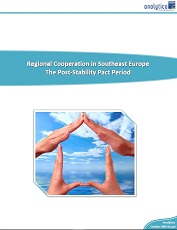Regional Cooperation in Southeast Europe – The Post-Stability Pact Period
Regional Cooperation in Southeast Europe – The Post-Stability Pact Period
Author(s): Manuela Riedeland, Marnix Eichelberg, Andreja Bogdanovski
Subject(s): Governance, International relations/trade, Security and defense, Economic development, Peace and Conflict Studies
Published by: Аналитика Тинк-тенк Организација
Keywords: Stability Pact for South Eastern Europe; Regional Cooperation Council (RCC); security cooperation; international guidance; European and Euro-Atlantic structures; NATO;
Summary/Abstract: The work of the RCC forms a successful continuation of the efforts of the Stability Pact for South Eastern Europe. The RCC can be seen as the most comprehensive regionally owned initiative for cooperation in Southeast Europe. Even in a time of economic hardship the countries in the region have shown their willingness and competence to continue to cooperate on important issues such as economic and social development and the safeguarding of peace and security in the region. There is a prevailing willingness among the countries of Southeast Europe to take measures against the economic crisis in a coordinated fashion. The RCC functions as a forum for the shaping of policy in this field. The RCC continues to provide the SEECP with operational capacities. Among many initiatives it supports regional cooperation efforts set up to deal with problems in the field of security and defence, like SEESAC, DPPI SEE, SECE-CRIF and the RACVIAC Center. Furthermore it maintains working relations with international organizations like the UN and the EU, governments in Europe and worldwide and civil society organizations.
Series: ANALYTICA - Thinking Laboratory
- Page Count: 18
- Publication Year: 2009
- Language: English
- Content File-PDF

